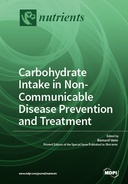Explore

Carbohydrate Intake in Non-communicable Disease Prevention and Treatment
Bernard Venn
2019
0 Ungluers have
Faved this Work
Login to Fave
In 2011, carbohydrates provided 63% of the dietary energy intake to the world’s population. Historically, carbohydrate-rich diets have been associated with good health and longevity but there has been a move away from traditional carbohydrate-rich diets, with refined carbohydrate taking much criticism for contributing to non-communicable disease. The aim of this Special Issue is to discuss the appropriate use of environmentally sustainable carbohydrate-rich foods in the modern diet in developing and developed countries in the context of prevention and treatment of non-communicable disease.
This book is included in DOAB.
Why read this book? Have your say.
You must be logged in to comment.
Rights Information
Are you the author or publisher of this work? If so, you can claim it as yours by registering as an Unglue.it rights holder.Downloads
This work has been downloaded 455 times via unglue.it ebook links.
- 59 - pdf (CC BY-NC-ND) at Unglue.it.
Keywords
- activity
- Body Weight
- carbohydrate
- carbohydrate exchanges
- Carbohydrates
- chronic disease risk
- CVD
- diabetes
- Dietary pattern
- discussion groups
- Ethnicity
- Exercise
- fibre
- Fructose
- Fruit
- glycaemia
- glycaemic glucose equivalents
- glycaemic response
- glycemia
- glycemic index
- glycemic load
- glycemic response
- insulinaemia
- intestinal biota
- isomaltulose
- Japanese diet
- kiwifruit
- Knowledge
- Low-carbohydrate diet
- mixed meal
- Nutrition
- Obesity
- observational study
- pasta
- postprandial
- potato
- Prebiotics
- preload
- Qualitative
- resistant starch
- Rice
- rice consumption
- satiety
- sucrose
- Sugars
- T2DM
- thema EDItEUR::P Mathematics and Science::PS Biology, life sciences
- timing
- type 2 diabetes
- type 2 diabetes mellitus
- Vitamin C
Links
DOI: 10.3390/books978-3-03897-819-0Editions


